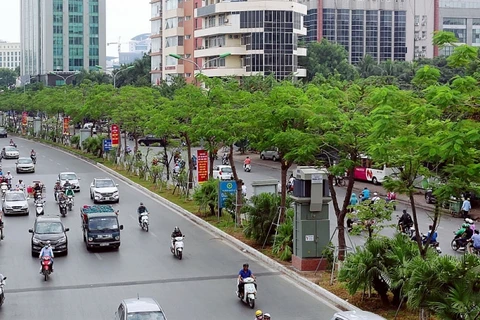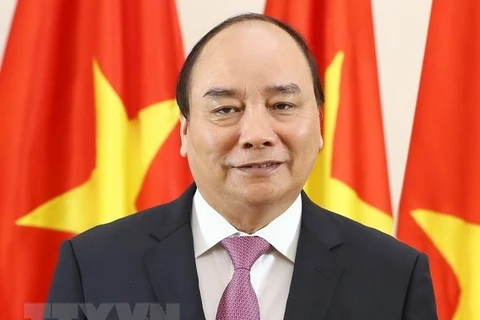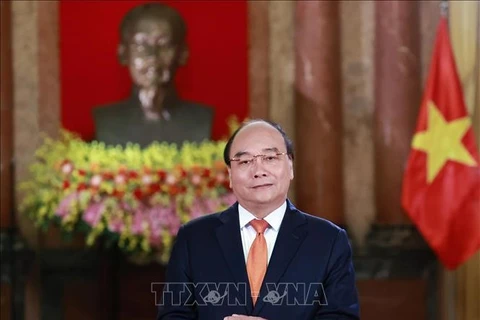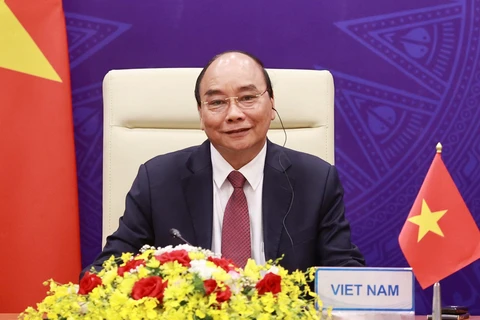Hanoi (VNA) – State President Nguyen Xuan Phuc on April 23 delivered a speech on the economic opportunities of climate change at the Leaders Summit on Climate which is held virtually on April 22-23, at the invitation of US President Joe Biden.
Following is the full text of the remarks of President Nguyen Xuan Phuc.
President Joe Biden,
Excellencies,
Ladies and gentlemen,
I thank President Biden for inviting me and other leaders to this very important Summit.
I welcome the United States’ return to the Paris Agreement. I believe that the renewed leadership and strong commitment that President Biden espoused during the opening session, combined with our shared efforts, will lead us on the path towards achieving the goals of the Paris Agreement.
Mr. President,
Climate change is undoubtedly a major existential threat to many countries and to our planet. In Vietnam, last year alone, extreme weather has taken hundreds of lives and reversed decades of progress in poverty reduction. The Mekong Delta, our rice bowl and the home to 20 million Vietnamese, is suffering immensely from sea level rise, especially towards the end of this century.
Mr. President,
Ladies and gentlemen,
Transitioning to a green, net-zero emission economy is an inevitable trend and imperative to limiting global warming to 1.5 degrees Celsius. This process will not be without challenge, but will certainly bring huge oppportunities and benefits in creating jobs, ensuring energy security, and enhancing economic competitiveness and sustainability. Vietnam is determined to follow this path. But we need a suitable roadmap for developing countries where much hardship remains. In this connection, let me highlight three points:
First, transition must be just and inclusive. It must ensure equal access to opportunities and benefits, place the people at the center, and leave no one behind. It must especially be supported by the people, businesses and scientists.
Second, we expect developed countries to continue to take the lead in emission reduction, at the same time give greater concrete support to developing countries, including Vietnam, in finance, new technology development, high-quality and efficient infrastructure and job creation. We welcome and look forward to receiving the assistance from the US International Climate Finance Plan and other international financial arrangements, including from international companies and corporations.
Third, the pursuit of climate goals should be compatible with each country’s conditions, including the need to alter lifestyles, modes of production and work. This endeavor must be integrated into national development strategies and plans. Each country must itself make efforts and make good use of international aid and resources. There need also be national mechanisms for oversight and evaluation of implementation to improve their ability to recover.
Vietnam is a developing country. Our industrialisation has only truly begun three decades ago. Yet we make every effort to contribute to global action. Vietnam had been quick to submit its NDCs and mainstreamed them into domestic laws for enforcement. By 2030, we pledge to reduce emissions by 9 percent with our domestic resources and by 27 percent with bilateral and multilateral support.
We will greatly reduce coal-based power generation and rapidly increase the share of renewables in the total primary energy supply to 20percent by 2030 and 30 percent by 2045. We will reduce the intensity of greenhouse gas emissions per GDP by nearly 15 percent by 2030 and methane emissions from agricultural production by 10 percent. Earlier this month, Vietnam launched a programme to plant a billion trees by 2025. This project alone is expected to absorb 2 to 3 percent of Vietnam’s total emissions by 2030.
Mr. President,
Ladies and gentlemen,
I am confident that the “challenges” of climate change shall be “drivers” for solidarity and positive change as we move towards COP-26 in Glasgow, and contribute to a more sustainable future for generations to come.
Thank you./.
Following is the full text of the remarks of President Nguyen Xuan Phuc.
President Joe Biden,
Excellencies,
Ladies and gentlemen,
I thank President Biden for inviting me and other leaders to this very important Summit.
I welcome the United States’ return to the Paris Agreement. I believe that the renewed leadership and strong commitment that President Biden espoused during the opening session, combined with our shared efforts, will lead us on the path towards achieving the goals of the Paris Agreement.
Mr. President,
Climate change is undoubtedly a major existential threat to many countries and to our planet. In Vietnam, last year alone, extreme weather has taken hundreds of lives and reversed decades of progress in poverty reduction. The Mekong Delta, our rice bowl and the home to 20 million Vietnamese, is suffering immensely from sea level rise, especially towards the end of this century.
Mr. President,
Ladies and gentlemen,
Transitioning to a green, net-zero emission economy is an inevitable trend and imperative to limiting global warming to 1.5 degrees Celsius. This process will not be without challenge, but will certainly bring huge oppportunities and benefits in creating jobs, ensuring energy security, and enhancing economic competitiveness and sustainability. Vietnam is determined to follow this path. But we need a suitable roadmap for developing countries where much hardship remains. In this connection, let me highlight three points:
First, transition must be just and inclusive. It must ensure equal access to opportunities and benefits, place the people at the center, and leave no one behind. It must especially be supported by the people, businesses and scientists.
Second, we expect developed countries to continue to take the lead in emission reduction, at the same time give greater concrete support to developing countries, including Vietnam, in finance, new technology development, high-quality and efficient infrastructure and job creation. We welcome and look forward to receiving the assistance from the US International Climate Finance Plan and other international financial arrangements, including from international companies and corporations.
Third, the pursuit of climate goals should be compatible with each country’s conditions, including the need to alter lifestyles, modes of production and work. This endeavor must be integrated into national development strategies and plans. Each country must itself make efforts and make good use of international aid and resources. There need also be national mechanisms for oversight and evaluation of implementation to improve their ability to recover.
Vietnam is a developing country. Our industrialisation has only truly begun three decades ago. Yet we make every effort to contribute to global action. Vietnam had been quick to submit its NDCs and mainstreamed them into domestic laws for enforcement. By 2030, we pledge to reduce emissions by 9 percent with our domestic resources and by 27 percent with bilateral and multilateral support.
We will greatly reduce coal-based power generation and rapidly increase the share of renewables in the total primary energy supply to 20percent by 2030 and 30 percent by 2045. We will reduce the intensity of greenhouse gas emissions per GDP by nearly 15 percent by 2030 and methane emissions from agricultural production by 10 percent. Earlier this month, Vietnam launched a programme to plant a billion trees by 2025. This project alone is expected to absorb 2 to 3 percent of Vietnam’s total emissions by 2030.
Mr. President,
Ladies and gentlemen,
I am confident that the “challenges” of climate change shall be “drivers” for solidarity and positive change as we move towards COP-26 in Glasgow, and contribute to a more sustainable future for generations to come.
Thank you./.
VNA

























